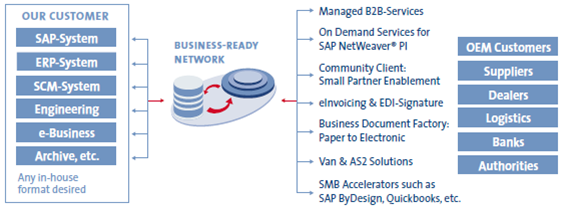SAP and Crossgate
At the end of September this year (20th September), SAP announced their intention to acquire business-to-business integration provider Crossgate. I was intrigued by this release and wanted to know more.
Who are Crossgate?
When you look them up on the Internet what you find is that they are a German company with their headquarters in Munich. The company was founded in 2001 as Indatex and renamed in 2006 to Crossgate. It is a privately owned company with over 200 employees.
What do they sell?
They provide electronic data interchange (EDI) and related services (XML industry standards, outbound e-Invoicing, inbound OCR and fax recognition, SMS, e-mail, WebEDI, Spoke Units, and CAD/CAM) as an on-demand service. They term this a “Business-Ready Network”. The company specialises in linking to SAP and they have more than 40,000 companies who already use their B2B 360° Services for SAP Solutions to exchange documents with customers, suppliers, logistics partners, governments, and banks.
What do these services provide their customers with?
It is pretty complete package covering managed services such as 24/7 professional support and consulting operations. Moreover, the available services also include transaction management, conversion and real-time monitoring, business integration analysis during transactions, long-term archiving, straightforward data transfer, JIT messaging, qualified electronic signatures, and validation services.

Figure 1: Crossgate Business Ready Nertwork (Source: Crossgate)
What I also found out was that SAP had acquired an interest in the company in October 2008. At this time, Crossgate also became a global provider in SAP’s business process outsourcing program, following the integration of NetWeaver Process Integration into Crossgate’s platform.
In February 2010, Crossgate announced that SAP was to resell Crossgate’s B2B functionality as an extension of SAP’s application functionality under the name SAP Information Interchange. SAP was to sell and maintain this offering. Most recently, SAP agreed to resell and market the SAP E-Invoicing for Compliance application by Crossgate, which allows companies to send and receive digitally signed, compliant PDFs or EDI invoices electronically. So as you can see Crossgate and SAP have had a recent history in close co-operation.
Therefore, when I came to have a briefing with Peter Kuerpick, SAP’s EVP & Corporate Officer, I was interested to know how SAP would integrate Crossgate into the SAP portfolio. Kuerpick explained that the acquisition was part of SAP’s Cloud plan. Today Crossgate supports EDI and other similar protocols: what SAP see is the product becoming the backbone of business network. Kuerpick explained that the initial integration would be to provide collaborative design support with full integration come later. As with any acquisition of software, this full integration will probably take somewhere between 12 to 18 months to complete. I asked about the target for this solution as many large enterprises already have a B2B solution in place whereas the larger number of SMEs may not have but do have a need for the capabilities offered by Crossgate. Kuerpick agreed and then showed that there was already support for the SAP products aimed at this market – SAP Business All-in-One, SAP Business ByDesign, and SAP Business One.
This acquisition will fill a gap in SAP’s offering to businesses and, by the fact that it is a service, it will have the appeal for SMEs of not being a capital cost but an operational one. Crossgate has already a well-established customer platform and, from their viewpoint, this will enable them to develop business outside of Germany. It would seem to be a real win-win solution for SAP, Crossgate and, not least, their customers and prospects.
